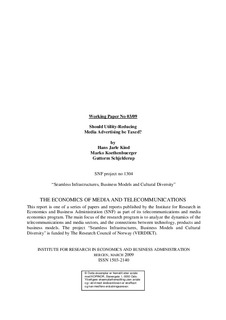| dc.contributor.author | Kind, Hans Jarle | |
| dc.contributor.author | Koethenbuerger, Marko | |
| dc.contributor.author | Schjelderup, Guttorm | |
| dc.date.accessioned | 2009-06-10T08:49:36Z | |
| dc.date.available | 2009-06-10T08:49:36Z | |
| dc.date.issued | 2009-03 | |
| dc.identifier.issn | 1503-2140 | |
| dc.identifier.uri | http://hdl.handle.net/11250/166170 | |
| dc.description.abstract | Empirical evidence suggests that people dislike ads in media products like TV programs. In such situations standard economic theory prescribes that the advertising volume can be optimally reduced by levying a tax on ads. However, making use of recent advances in the theory of Industrial Organization and two-sided markets we show that taxing ads may be counterproductive. In particular, we identify a number of situations in which ad-adverse consumers are negatively affected by the tax, and we even show that the tax may lead to higher ad volumes. This unorthodox reaction to a tax may arise when consumers significantly dislike ads, i.e. in situations where traditional arguments for corrective taxes are strongest. | en |
| dc.language.iso | eng | en |
| dc.publisher | SNF | en |
| dc.relation.ispartofseries | Working paper | en |
| dc.relation.ispartofseries | 2009:3 | en |
| dc.subject | two-sided markets | en |
| dc.subject | media market | en |
| dc.subject | pricing strategy | en |
| dc.subject | ad-tax | en |
| dc.title | Should utility-reducing media advertising be taxed? | en |
| dc.type | Working paper | en |
| dc.subject.nsi | VDP::Samfunnsvitenskap: 200::Medievitenskap og journalistikk: 310 | en |
| dc.subject.nsi | VDP::Samfunnsvitenskap: 200::Økonomi: 210::Samfunnsøkonomi: 212 | en |
